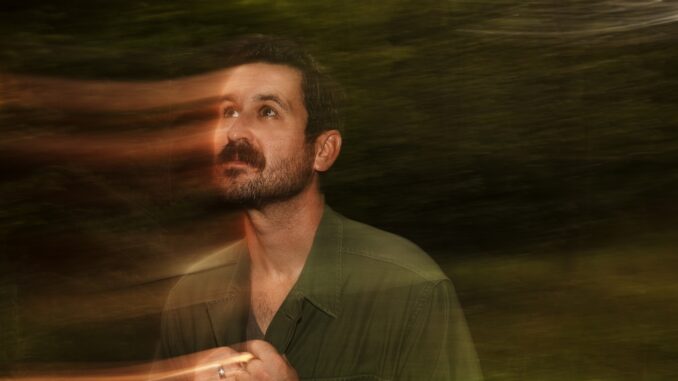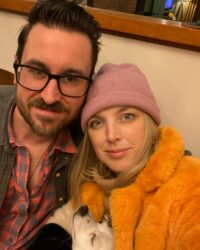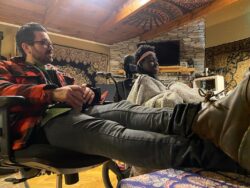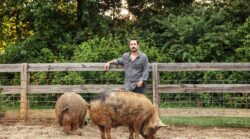
Looking at the cover artwork for Sean McConnell’s latest album “Skin” (Silent Desert Music, 2025), you might think he has a fixation on tattoos, what with the drawing of a hand covered in ink art from fingertip to wrist. Actually, he has only one and seems shy about it. “Mine is my wife’s name in a banner, a classic style that I got maybe twenty years ago.”
Many guys would be reluctant to have an indelible reminder of a romantic affair, fearing when it ended, the next girl to capture his heart would be faced, unfortunately, by that same heart, which already has an arrow through it with his old girlfriend’s name boldly apparent.
No such worries for McConnell, a happily married father who might be wondering if any mid-life crisis is around the corner after turning 40. He’s too busy for any of that, immersed in all aspects of the music business besides writing, recording and performing his own material. To him, making music is an act of faith and hope in itself, and that’s reflected in his considerable output. Besides the eleven albums he has released, McConnell’s name also appears as a writer or co-writer on songs recorded by Tim McGraw, Brad Paisley and a number-one hit single by Brett Young.
Whether melancholy, slow tunes or full-steam rock ’n’ roll, McConnell’s voice sounds fresh and expressive on the folk-rock vibe side of Americana. His lyrics are well-thought-out and layered with meanings beneath the surface, driven by craft and meticulousness. He is not just another acoustic song poet struggling to make a splash, but is in it for the long haul. “I try to write from the perspective that there is a song waiting to be written,” he explains, “and I just have to get it out of my head and on paper.”
This is what makes “Skin” (and, really, all of Sean McConnell’s discography) so magnetic. He somehow verbalises the inarticulable. While his lyrics are typically highly specific to his own life, detailing everything from recent interactions with strangers to current sources of interest, even finding the blessing in fathering a teenage daughter with special needs. He’s an expert in using specificities to get at these ineffable, broadly familiar feelings by couching them in the particulars of his own experience. Just listen to the fervent pressure of ‘Demolition Day,’ the bittersweet intimacy of ‘Missing Person,’ the blistering catharsis of ‘Divinity’ (“Folding my hands together, Squeezing the blood out of a rosary, I light another candle And pray to the ghost of your divinity”).
McConnell has been in the business for almost three decades now, but somehow, his work still feels as fresh now as it did back then. A lot of musicians change over time, increased exposure encouraging them to over-produce their sound, to lean into the “music industry” of it all, but “Skin” feels just as ripe as his earlier works. But there’s evolution, too: improvements in sound quality, production technique and instrumentation, all of which augment rather than detract from the sound that has propelled him into being a club favourite. There’s a maturity here, a lived-in quality that can only come from years of honing one’s craft.
McConnell manages to explore life’s paradoxes without needing to find answers, and that becomes very clear as the following interview is read.
The best part of being a musician is the music.
Americana UK: Hi, Sean. I hear you’re in New York City. What’s going on there?
Sean McConnell: I’m playing a show at the Café Wha? tonight.
AUK: That club has been around since the ‘50s. On the corner of MacDougal Street. It was before your time, but I saw artists like David Blue there, Cat Mother & The All-Night Newsboys, some comedy acts.
SM: I haven’t heard of David Blue.
AUK: His best album was called “Nice Baby & The Angel.” He was a folkie, sort of a tragic figure. Your music reminds me a little of his, but hopefully not the tragic part.
SM: Me too. I’m excited to play the show. I’ve never been there.
AUK: It’s a piece of music history. I was fascinated by the symbolism in your new record with the image of the palm and the tattoos on the palm, especially since it’s Ash Wednesday this week, and ashes come from the palms from the previous Palm Sunday. And your record seems kind of like a deconstruction, reconstruction sort of thing, life at 40. Angel on one shoulder, devil on the other. So, could you tell me a little bit about what the thread running through it is for you?
SM: I think you’re right on the money. It’s an exploding of myself and a hopeful rebirth, which is something that’s an everyday thing, but there definitely is a dismantling of past paradigms and habits. All sorts of things that, not only lyrically, started this record, that thread, but during the making of the record, that story only increased. It’s kind of wild. I keep saying that the record made me on this one, not the other way around. It felt like it was ahead of me, and in a really beautiful and kind of eerie way. But it does have to do with a kind of dying and rebirth.
AUK: Have you ever had your palm read? I was wondering about the symbolism.
SM: No, never had my palm read. The tattoo in the palm originated from when I was writing these songs. I was overseas, and whenever I’m traveling, I always flirt with the idea of getting a tattoo, and I’ve only actually gotten one tattoo. But I had a booklet of all these tattoos that I’ve thought about, and most of them are what you see on the cover of the record. We sent graphics the idea of putting those with a hand for the cover, and they just really did a beautiful job with it.
AUK: Which one of those is yours?
SM: Actually, none. Mine is my wife’s name in a banner, a classic style that I got maybe twenty years ago.
AUK: You are turning 40, which is almost a cliché. A lot of people see 40 as the coming of the second half of life. Did you think about what you want to do with the second half of your life?
SM: I don’t know at this moment. I want to live a really balanced life of being an artist, being a producer, and being with my family and taking care of our land. We have a little bit of property in Tennessee. We’ve got some animals, and I’m a father of a 14-year-old beautiful girl, and my wife, Mary Susan, who I’ve been married to for 20 years now. For me, a good balance is a life where I get to wake up and be there with my family, be part of the daily routine, walk up to the studio and make records I believe in. Just continue to be as present as I can as a human and as a soul, and figure it out. We’re all trying to do that.

AUK: You were born and raised in western Massachusetts, same as me, around Route 2, the Mohawk Trail, near Quabbin reservoir, right?
SM: Yeah. Athol in Franklin County. That’s quite the coincidence. Athol is an old factory town where most of the people worked making tools.
AUK: Then you moved to Marietta, Georgia. Your parents were folksingers. In a situation like that, the child either rebels and goes in a different direction or becomes a musician, keeping it in the family.
SM: It sounds like a cliché, but from the minute I picked up a guitar and learned how to play it, I knew that was going to be for me. I didn’t even think about it. I just knew that this was my thing, and it was going to be forever. I definitely had a few less-than-desirable high school jobs, ice cream parlor and that type of stuff. But from about sophomore year of high school, because I had seen my parents do it, the question always was, can you make a living off of music? It seems like such a pipe dream, whereas I just saw my parents going out and gigging. It wasn’t there. My father had another job, but they were kind of like weekends or a day a week here or there, but still working musicians. When it came time for me to start gigging, I just got a cheap PA system and put it up in the corner of wherever they’d have me and put out the tip jar.
AUK: It’s nice when the universe points you in the right direction.
SM: I feel very fortunate to have found it when I was young. It’s a struggle for a lot of people to feel like they know what they want to do or what lights them up.
AUK: From there, you moved to Nashville. You got into writing for others like Tim McGraw and Rascal Flatts. Was that where the opportunity was, or was that what you were into at the time?
SM: It was a total left turn of my career from about my senior year of college. I had the good fortune of meeting Alicia Pruitt, who was working at Warner Chapel Publishing at the time. She had heard of me and came out to a show, and after the show, said I really would love to sign you as a writer. I knew what a publishing deal was because I had a degree in music business. You fall in love with writing songs, so in that moment, this new idea was very foreign to me.
Fast rewinding back to the publishing deal, I was really nervous about what it means to give up some ownership of your songs. So I turned it down for months until I trusted her and she laid out a plan for how I could be me inside of this thing. The long answer to that short question is, Nashville is where country music is happening. It did end up being writing for country acts, but the crossover of my folk upbringing made it pretty effortless. It’s burnt into you. The song is everything. The song has got to be airtight.
AUK: What song did you write for Brad Paisley?
SM: It’s called ‘You Love Me So Good.’ Actually, that’s a co-write with Anders Osborne, who is a guitarist.
AUK: Which one for Tim McGraw?
SM: I had a song that was on a record of mine called ‘Mr. Whoever You Are,’ and I guess Tim heard it and liked it, so he recorded it.
AUK: Then you had a hit with Brett Young.
SM: It was quite a ride. ‘Mercy’ was my first and only number one song.
AUK: How did that feel?
SM: It was such a blessing, came out of the sky. I remember loving the song when we wrote it, and I’m really enjoying my day with Brett, but at the time, he was not the Brett Young he is now. He was still getting things going, and so I just thought this was a great day with a new guy with a great voice. Then we get the call, I don’t know, however many months later, that it’s not only going to be on the record, but it’s going to be a single, and then, oh my gosh, it looks like it’s going up the charts. Then they’re like, it’s going number one. And that was a good call to get.
It’s about songs that make you feel less lonely.
AUK: That’s exciting. It must be like winning a Pulitzer for a writer, not that I’ve ever even sniffed that. On your latest record, you could say its thematic center is ‘Older Now.’ “But I’ve got a ways to go, And in 20 years or so, Oh, this man I’ve come to know He will seem to me a child.” Very powerful line reminds me of a Tower of Power song, ‘You’re Still a Young Man,’ but don’t waste your time.
SM: I like that. When you said earlier, there’s a point in your life where 40 feels like the halfway mark, I’m having so many life-changing seasons, both good and bad, all for the forward motion of how things should be going. But I feel like I at least I know enough to know I’ll look back and think, wow, I didn’t know anything at 40. If I’m blessed enough to keep making it down the road, I think it’s just another song on this record about trying to look back and make peace with who I was, who I am, bring any wisdom to myself that I can hold onto as I move forward. It’s also about how clichés are there for a reason. Things like you can try to help someone, but really, you can’t reach in and just fix someone’s problem. There’s a line in the song about that. Just trying to let go of things that have really hung me up for years and years. We all just try to move forward with a little more wisdom, a little more presence.
AUK: I’ve learned your daughter has some special needs, and that came up in your song, ‘The West Was Never Won.’ The first verse is evocative: “Look in the eyes of a new child. Assign a name, a number. Make God a good and a bad guy, just so they always wonder.”
SM: Thanks for asking. Cerebral palsy is the overall situation which comes along with many other things. She’s 14 years old now. She is in a hot pink, sparkly wheelchair, and she’s nonverbal, but she’s very expressive and communicative. Loves music. She was riding horses for a long time, and she’s enjoying swimming. Like any other 14-year-old girl, she’s got things that she loves and is lit up by.

AUK: Horses are very therapeutic.
SM: My wife grew up with horses, and I was not aware of the magic nature and the healing energy of a horse. They’ve been a big part of our lives since our daughter’s been here, and we have a big respect for horses, for sure. We’ve gone to a horse therapy program for ten years.
AUK: Do you have other animals on your property?
SM: We have two massive Kune Kune pigs that we thought were tiny piggies. Niles and Daphne. And we have two mini ponies we’ve recently adopted from Wisconsin. The winters were getting too brutal for them at their age, and my wife and her friend drove a minivan up there from Nashville, got these mini horses and drove ’em all the way back down here.

AUK: I saw a picture on Facebook of your daughter in your home studio recording a song, I guess.
SM: Years ago, we figured out that she really enjoys music. What started out actually as me seeing her reacting to synthesizers on the radio or on records, and we would talk about what a synthesizer was. Then I brought her into my studio to play one of mine, and we quickly realized that while she might not have the dexterity of each finger having the motor skill for playing a chord, she can go left to up and down. We figured out the angle for the keyboard and where it’s comfortable, and it really opened up a way for her to play an instrument. She loves it. She’ll look left for yes, right for no. It might be that track’s over; do you want to add another track on top of that? Yes. Let me pull up a couple of sounds. It’s a really fun process where she gets to make choices and express herself. It’s creative. It’s also really hilarious to her sometimes when the sound will change, and it kind of surprises her. It gives us something to share together, any father and daughter would like to have. It’s a really a sacred time.
AUK: You’ve put some orchestration on ‘Take It Easy, Darling.’ What’s the thought process that says this one needs to have some orchestration behind it?
SM: Oftentimes, I feel like the song just has that space, and strings would take this over the top. This is kind of dangerous because strings almost always sound good, but do they suit the song, for example? By the way, we’re talking Sista Strings, which is Monique and Shauntee Ross. These are two sisters, cello and violin. They’re on full display here, these beautiful stacked strings sections. They also put strings on the last track called ‘New Sons and Daughters,’ and it was gorgeous and huge, but it almost took away from the intimacy. We mixed it so in the bridge it peaks its head up a little bit, and it acts as an addition.
AUK: Talk to me a little about South Side of Forever.’ To me, that’s the best song on this record.
SM: It was one of the first songs that came out on some trip. Regardless, I was riding a lot of trains, and there was this one character on the train car where – I don’t know if it was a story in my head or an energy I was reading – but it just felt like he might not be long for this world. There was something going on. And the unfairness of situations like that it kept sticking with me. When we got off the train and into a hotel, I went for a really long run in Bristol by the water, and all those words just came out. At the same time, I was grappling with, here I am singing my songs and traveling, and someone else’s life is not good. How do you make those two things exist in the same time?
AUK: The first time I heard your music was the previous album, “Horrible Beautiful Dream,” and it prompted me to listen to some of your past work on YouTube. You are prolific with, I believe, 11 albums now. What were you going for with the title on the last album?
SM: That’s a line that comes from a song. I believe it’s the last song on the record. I guess you could classify it as a COVID record. It came out during that time, and I feel like the answer to this is every song I write; I’m trying to balance the darkness and the light that we’re all feeling. We don’t know how we got here. We’ve got a lot of great guesses. I think that we’re all mostly way off, and it’s something that we can’t possibly comprehend, but while we’re here, it’s like the guy on the train again. How do I hold these two things at the same time, the darkness and the light, and find joy and peace in this chaos. There’s so much beauty and there’s so much destruction, and that’s how it’s always been and feels like how it might always be. Who knows how these things work, but man, if we don’t choose to find the light, and when we do stare at it and soak it up, it seems like a horrible, beautiful dream. I wouldn’t want to not be in this dream, but it’s sure is a nightmare sometimes.
AUK: On the “Saints Thieves & Liars” album, which came out in 2010, the cover art was really interesting with the sketch of the brain and the words inside it. I don’t know if you could say that record put you on the map, but it sure is a good one.
SM: It was independently released. Brian Pruitt, a drummer and friend, produced three of my records during that period. I love that record so much. It feels like another life ago, but we got to do that record at Ocean Way, which I still can’t believe. I toured my ass off to afford making that record, and I’m so glad that I got to do a record in that studio in the A Room and some in the B Room as well. That was right at the peak of me starting to tour heavily, a lot in Texas, actually, which was another unexpected left turn in my career. I still play a couple of songs off that record to this day.
AUK: There were a couple of rock songs on there – ‘Carolyn’ and ‘Lie Baby Lie,’ and ‘Closing Time’ is a standout track.
SM: I occasionally still do play ‘Closing Time.’ There’s one called ‘Maybe You Can Love Me Anyway’ that I play often. I’m trying to think of the other songs on that record. ‘Lie Baby Lie’ is another. Yeah, maybe those three.

AUK: Your self-titled record was your first on Rounder. ‘Holy Days’ was a marvellous song.
SM: Sometimes these things just come out of the air, almost like they’re someone else’s story. I went to a cabin for a week or two, and I brought a little recording rig, basically just locked myself away. ‘Holy Days’ was one of the first tunes. That whole chorus just came out of the sky. Actually, at the time, it felt stylistically not like me, and I was really curious to finish the song. Then, lo and behold, it became almost the title track of that record. That’s another song I still play.
AUK: You have a good eye for characters in narrative form. On ‘Queen of St. Mary’s Choir’, is that you a real person or someone you created? You sing about the little house on Lake Street, and it starts: “I was born in Massachusetts, I was forged out of the fire Between the guitar kid from Hudson And the Queen of Saint Mary’s Choir”.
SM: That’s my mom. And that song is about as autobiographical as it gets for me. It’s pretty much a retelling of parts of my history and my parents and family. I sing that song, especially when I’m opening, and people don’t know who I am. It’s a quick way to give ’em a little history of growing up in music and what’s important to me.
AUK: In ‘Ghost Town,’ you sing, “I want to build a shrine or burn it to the ground”.
SM: That’s real. That’s going back to those Georgia years as an adult over a decade ago. Just driving around, and it’s like nothing and everything is what you remember. It feels kind of weird. And also, there’s a little disillusionment looking back at certain memories being tainted or changed as you get older, dealing with some of those things.
AUK: What would you say was the best piece of advice you ever got from someone regarding your career as a musician?
SM: I can’t even remember exactly how he put it, but a fun, important story to me is when I got to open a couple of shows for Bruce Hornsby five or six years ago. He watched my set and was very complimentary, but also he said something almost, not flippant, but “I’ll be interested to see how you make this not just another guy with a guitar“. He urged me to sonically open up my mind. I don’t even know if he thought much about it, but I sure as hell did. It really was big. That simple advice put me into a place where I went and recorded “Secondhand Smoke,” which was sonically a big departure, my first foray into engineering and playing all the instruments.
AUK: What would you say is the most rewarding aspect of being a musician? In other words, what’s the best part of your job?
SM: That I get to do what I am obsessed with for a living. I feel like one of the luckiest people alive; I love what I do so much. Seeing a song come out of the air and feeling like a part of it is such a gift in itself. Then, seeing with this record, for example, four of my closest friends who I’ve been on and off the road with for over 10 years gather, and then we have these recordings that are equally as magical, just falling into place. You end up with not only a beautiful record, but memories of seeing these things being born. What more could you ask for? Of course, I want this record to be successful. Of course, I want more people to show up. I want those things just like anyone else does. But I think, to answer your question, the best part about being a musician is the music. I take it less for granted now.

AUK: What is your all-time favourite album?
SM: How can you ask me that question? Can you answer it?
AUK: Yes, if you’re talking last century, it would be Al Kooper and Mike Bloomfield’s “Live Adventures Of.”
SM: Okay, I’m probably going to go with one for its effect on me as a songwriter and when it came into my life. It’s a record called “Home Again” by David Wilcox. Growing up, I would steal my dad’s guitar when he went to work and put in a David Wilcox VHS. I learned about open tunings and writing songs through him, though he would never know it. He and my father are probably my two biggest songwriting influences, so I would put that record up there for sure.
AUK: What do you hope people take away from your new record?
SM: I hope they feel as if they’re journeying in a similar way. I hope they feel a little camaraderie, or how someone else is feeling about things, asking questions. I don’t do this intentionally; it’s probably because I don’t have answers. Asking questions rather than having the answer, sometimes it can feel lonely. I think that a lot of us feel that way. And if people hear this record, maybe they think that’s okay or feel a little peace sitting in the unknowing. It probably comes down to my worldview, or whatever you would call it, like in my younger years wanting more control. I thought I could figure things out if I studied them hard enough, where I could control them this way or that way. I think the letting go into the mystery becomes a freedom, even though sometimes it can feel lonely. So maybe this record will make people feel less lonely.


